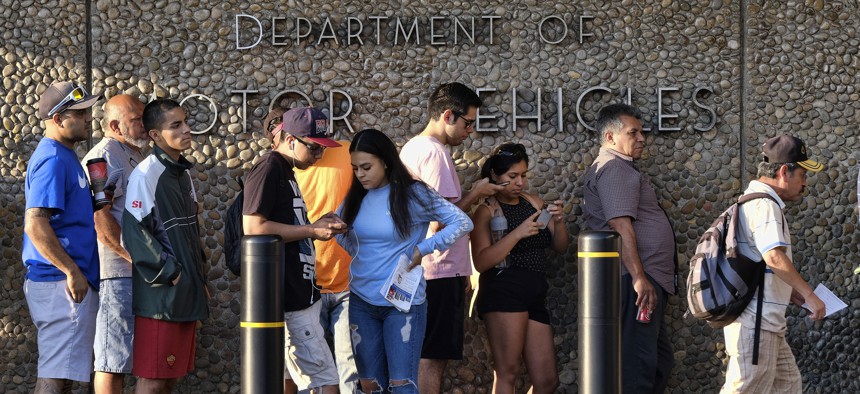Audit Reveals Big Problems at Struggling California DMV

In this Aug. 7, 2018, file photo, people line up at the California Department of Motor Vehicles prior to opening in the Van Nuys section of Los Angeles. AP Photo

Connecting state and local government leaders
STATE AND LOCAL ROUNDUP | Pittsburgh City Council preliminarily bans use of assault-style weapons … Utah sentencing reform heads off deportations … Minimum wage override.
A trip to the California Department of Motor Vehicles is pretty much as bad as they say, according to a state audit released this week. The state’s Department of Finance, working partly from material reported by undercover agents sent to more than 30 offices, sent a 67-page report to Gov. Gavin Newsom that ticks off a series of workplace and service problems. Among many areas ripe for improvement, investigators found that the department struggles with outdated organizational structures and technologies; that staff-absentee rates run more than 80 percent higher than the national average; that about 30 percent of service windows are closed during business hours; and that a “reactive” management culture fails to tackle priorities—such as implementing the Real ID program that requires the department to soon begin issuing special ID cards to residents seeking to board airplanes or enter other federal facilities without a passport. Auditors found that the department fell down in handling basic functions. As the Sacramento Bee reported, one in five DMV customer-service employees have yet to attend either driver license or vehicle registration program training, and the department reports misleading customer wait times, which might be particularly galling given that, last summer, DMV wait times in some cases stretched longer than six hours. Former Gov. Jerry Brown last fall requested the audit after Republican Assemblyman Jim Patterson of Fresno proposed launching a broader investigation into the DMV. Newsom, who took office in January, has already formed a “strike team” to address the the DMV’s failings. “I have increasing confidence this is now being treated as a serious matter,” Patterson told the Bee. “They’re not making excuses or looking the other way.” The audit suggests simple solutions the DMV could implement quickly to make a difference, such as accepting credit card payments and sending text-message notifications. [Department of Finance; Sacramento Bee]
GUNS | The Pittsburgh City Council this week gave initial approval to a suite of gun-control bills that would ban the use of assault-style weapons and outlaw armor-penetrating ammunition, large capacity magazines and bump stocks meant to accelerate rates of fire. The bills would also give judges the power to remove firearms from residents who pose an “extreme risk” to themselves or others. The bills came in response to the October Tree of Life massacre in Squirrel Hill, in which authorities say a gunman used an AR-15 rifle assault-style weapon in an attack that killed 11 and wounded seven at the synagogue. Council members Anthony Coghill, Darlene Harris and Theresa Kail-Smith voted against the bills, pointing to a state law that prohibits local governments from regulating firearms. [Post-Gazette; WHYY]
MINIMUM WAGE | Maryland lawmakers on Thursday overrode Republican Gov. Larry Hogan’s veto of a bill that will gradually increase the state’s minimum wage to $15 an hour. Hogan argued the bill would cost jobs and “devastate” the Maryland economy. He offered to support an increase to $12.10 instead. The veto-override vote wasn’t even close: 96-43 in the House of Delegates and 32-15 vote in the Senate—eleven votes to spare in the House and three in the Senate. [Baltimore Sun]
IMMIGRATION LAW | Utah Gov. Gary Herbert this week signed into law a sentencing reform bill that cuts the maximum sentence for a misdemeanor by one day, from 365 to 364. The change protects non-citizens who are legal residents from deportation because, under federal law, non-citizens sentenced to at least one year of detention for any charge can be deported. Colorado lawmakers passed a similar bill this month. In both states, the proposals drew bipartisan support. Washington state passed an early version of the reform in 2011. [Utah.gov, Salt Lake Tribune, Colorado Sun]
HOMELESS STUDENTS | The Texas House is considering a proposal to grant free state college tuition to homeless students. Introduced by Houston Democratic Rep. Ana Hernández, the bill would benefit an estimated 2,000 students per year and would be limited to 10 semesters. Students would apply annually with a notarized affidavit. The bill is one of at least two dozen filed this session in Austin aimed at supporting the state’s homeless population, according to the Texas Observer. A 2018 survey estimated that 10 percent of college students nationwide suffer homelessness. [Texas Observer, Wisconsin Hope Lab]
John Tomasic is a journalist who lives in Seattle.

NEXT STORY: Trump Administration Wades Into Local Zoning Dispute, Backing a Church Over a Village




